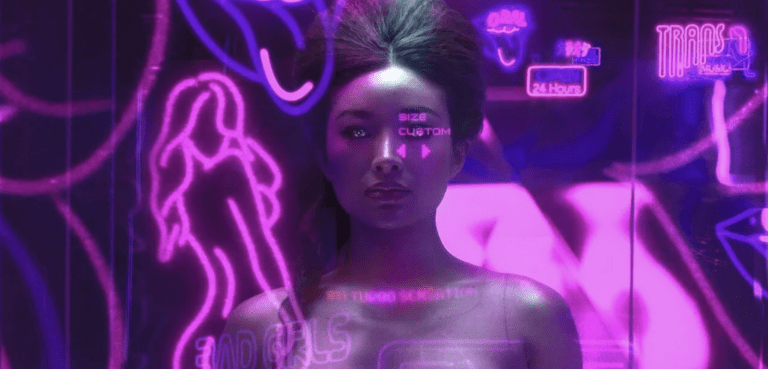
‘Tomorrow + I’ Episode 2 ‘Paradistopia’ Review
In ‘Paradistopia’, the second episode of Netflix’s sci-fi anthology ‘Tomorrow + I’, we’re shown a future where a young woman named Jessica Hearthighhill starts a business designing and selling sex robots and opens a resort to provide the customers with everything they desire.
Due to the nature of the business, she faces pushback from a conservative-minded government, as well as a general public who don’t want such things to happen in their country.
There’s a lot that can be said about this episode, but the first thing that needs to be mentioned is how it looks, which is remarkable. It’s visually striking from the start, with a retro futuristic aesthetic of 1950s and ‘60s designs, and eye-popping colors. There’s also so much camera work, with constantly switching aspect ratios, novel camera angles, and all kinds of artistic effects and tricks. So much so that it can start to feel like a film school project, where the director doesn’t quite know what to do, and is throwing out everything they can think of onto the screen. It can be a bit too much at times, but you can tell that there’s some actual artistic vision behind it, and it’s not just the same generic sci-fi future we’ve seen hundreds of times.
Likewise, there’s a lot of variation in the tone. As you’d imagine, there’s a lot of sex and nudity in this film, which can stretch things to the limit at times, though for the first half, a lot of it is played more as comedy, with over-the-top characters and scenes that verge on the sexploitation genre. This then gives way to a much more dark and disturbing tone, as the story shifts into more uncomfortable territory.
While there’s a lot of joking about the people who want to shut down the company at the beginning, the more that’s revealed about these robots, the more disturbing it becomes. As a politician points out during a talk show appearance with Jennifer, there’s a very real risk of people treating their robots in abusive ways, which could lead to those tendencies spreading into their real-life interactions. This comes true for Jessica’s boyfriend Witt, who’s been testing out the robots and starts slapping them, but the robot is happy to let him do it, and he accidentally does the same to Jessica while making love to her.
There’s also a scene at the launch of their new models, where everyone is allowed to create a robot to their own personal design, incorporating any characteristic they want, going into their darkest fantasies, with hardly any limits on what can be created, even if this leads to some uncomfortable ideas.
While this makes it seem that the whole idea is bad, we eventually find out more about why Jessica is doing it in the first place. Her mother was a prostitute in a poverty-stricken area, and it’s suggested that Jessica herself was abused as a child. She’s creating the robots so she can put an end to this trade and stop the human suffering it causes.
Underneath all the flashy visuals and camera work of ‘Paradistopia’, there’s a real story that’s genuinely thought provoking. The wacky style of this film helps to make this all the more clear when it does show the dark underside to these actions, the danger of trying to do a good thing, but actually making it worse through unintended consequences. There’s certainly a lot going on here, and some parts of it works better than others, but for an anthology designed to ask questions about technology, and in a time when artificial intelligence and robotics are advancing at an alarming rate, it really demands some serious thoughts on how we want our future to look.



